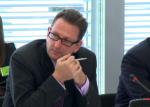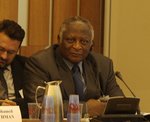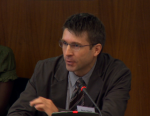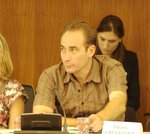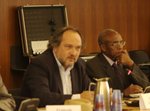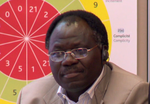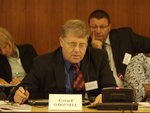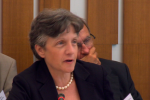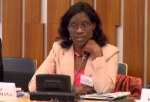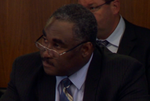-
all the session in:
bilingual original version
français
english
(Début de la séance : 9 h 20) // (Beginning: 9.20 a.m.)
Andrew CLAPHAM
original version
Good morning. Welcome back to the Conference. It was suggested on the first day that the Chairs would introduce themselves, so I am going to take a few minutes to explain who I am, where I am coming from and what I am doing here.
My name is Andrew Clapham. I am the Director of the Academy of International Humanitarian Law and Human Rights, which is one of the co‑organisers of this Conference. I have to admit straight away that I have not done the work, and I am not going to try and take the credit. It’s all been Professor Vincent Chetail and Christophe Golay who have put this together on the Academy side. I am extremely grateful for them, (...)
-
all the session in:
bilingual original version
français
english
original version
Thank you very much, Mr. Chairman. Good morning to all the participants. We are certainly pleased to be here to brief you on what we have been doing and to hear from you, where you think we may have done well, where you think we should be going.
The 2nd Session, of course, the day before yesterday, raised a lot of issues for the Office of the Prosecutor. Some of the issues listed in the agenda were not, I believe, quite dealt with sufficiently. I will try to give my responses to some of the questions and the comments raised, and also my views on some of the agenda items for the session of the first day.
But, in doing so, I would like (...)
-
all the session in:
bilingual original version
français
english
original version
Thank you, Mr. Prosecutor. That was very full, frank and very responsive. I think the conference is very grateful. Indeed I would like to just pick up maybe one thing that you said at the end about the problem with the U.K. My understanding is that the government was thinking of introducing some legislation which would make it possible to try those people in the territory of the United Kingdom. And I think it’s a problem which is probably replicated around the world because most states have introduced the laws which allow you to try for genocide, crimes against humanity or crimes in an internal armed conflict as a result of the ICC (...)
-
all the session in:
version originale bilingue
français
english
transtlated version
I must say that this symposium was a return to the past for me, and it is with great pleasure that I am participating. I must confess I feel like going back again. Maybe I will get over it when I will leave Geneva, but I must confess that is how I am feeling now.
On the completion strategy, I must make another confession. We are the ones who invented it. And I must say that today, after experiencing it, I am not so sure that it was a good idea. In 2002 already, we were facing political pressure. We were facing political pressure from members of the Security Council who were asking: “How long again are you going to take before finishing (...)
Andrew Clapham
Thank you very much, Ambassador Carla Del Ponte, for that impassioned and inspiring look at the work of the Prosecutor.
Now, my first career was actually in theatre, and the first rule that you learn is that you should always have the interval at a point when the audience wants just a bit more. So I think we’re going to actually have the coffee break now. It will give you time to think exactly what points you want to make in the second half of this morning, and we will reconvene here at let’s say eleven o’clock. Thank you very much.
(Suspension de la séance : 10h 40)}
-
all the session in:
bilingual original version
français
english
(Reprise de la séance : 11 h 05) / (Beginning : 11.05am)
Andrew CLAPHAM:
Welcome back to the second half. I’ve had requests for one or two people to address certain issues, and I’d like to try and group the themes a bit. So the first theme that I’ve been asked to readdress is the question of the completion strategy, which has been addressed by, obviously, both the speakers, and I had a request from Ambassador Prosper to address that question.
Pierre-Richard PROSPER
original version
Thank you, Mr. Chairman. I think there’s some confusion regarding the completion strategy, or the issue, actually, takes on a life of its own. Madame Del Ponte reminded me of the sequence of events.
That it is true that we in the Security Council began to put a lot of pressure on the Tribunals to focus on closure. And I’ll be frank, the primary issue is we began to get internal pressure regarding the costs of the effort. We in the United States and other governments, everyone kept raising that question: « This is expensive. This is expensive. » So the idea came up and said, well, let’s find out what the mission is, and when will these (...)
Andrew CLAPHAM
Thank you. Would anybody else like to address the completion strategy? Yes, Mr. Muna.
-
all the session in:
bilingual original version
français
english
original version
Thank you, Mr. Chairman. I do not think that the phrase « completion strategy » is really apt to describe what we are eventually obliged to do, not only through discussions but through the pressure of the budgetary committee of the United Nations. It was a question of stop strategy rather than a completion strategy.
A completion strategy involves the completion of your work. I don’t think that what the Tribunals were asked to do was to complete their work. They said : « Enough is enough. We the politicians say you have to stop sometime. » And they have to bring out something which was acceptable to stop. When we are talking about independent (...)
Andrew Clapham
Thank you. At this point, I’d like to give the floor to Jean‑Marie Biju‑Duval.
-
all the session in:
version originale bilingue
français
english
transtlated version
Thank you, Mr. Chairman. I would like to say a word on that point. In the legal arena we know that there are judicial fictions that are quite useful. Others appear very futile or even dangerous to me. Trial in absentia, in my opinion, seems to fall in the latter category. We all know that in our system trial in absentia actually exists, but we are aware of its limits and its value. We are clear headed enough to know that trial in absentia has really nothing to do with a proper trial because of the lack of adversarial inter parties proceeding.
It may be exaggerated to put it that way, but I will try to go ahead to facilitate the (...)
Andrew CLAPHAM
I think we’re obviously not going to be able to resolve it to everybody’s satisfaction today, but I think we’ve got the main issues and the main arguments out on the table. I had also a request from Thierry Cruvellier on the question of transfers.
-
all the session in:
version originale bilingue
français
english
transtlated version
First of all, a small reaction to what Madam Del Ponte said, because I’m afraid that you are taking us backward on the issue on which you helped us to make progress yesterday, the political arena. It seems to me that you are proposing the dream of justice without politics, that is, a world without politics. And there I have doubts because it may be a dream, but it’s a dangerous dream. You mentioned the issue or the problem of Judges who are legislators. I believe that one of the problems we’ve faced with these Tribunals is that they have ended up to work in a system that does not respect anymore the separation of power which is a source of (...)
Andrew CLAPHAM
The other question which I had noted down, which I think would deserve maybe a response from Defense counsel, one or two of them, is this question of self representation in court, which Ambassador Carla Del Ponte had some very strong views on. And I would be interested to hear, or maybe the group, I hope, is interested to hear if there is response from Defense counsel. I had Vincent Lurquin marked down.
-
all the session in:
version originale bilingue
français
english
transtlated version
Effectively, there’s a possibility in civil law to have a legally assisted counsel. That is, if someone does not want a counsel, the Bar president would appoint a counsel to represent that person. He states the law and advises the accused. At the Cour d’assises (Criminal court), a counsel is necessarily present at the side of the accused. And where he is absent, for any reason, the trial stops. So we may try to apply this legal proceeding at the level of the international tribunals. But the lawyers should be appointed by a Bar president.
But with your leave, since Madam Del Ponte asked me a question, she said the role of the Prosecutors (...)
Andrew CLAPHAM
My eyesight is not up to it, but I’m going to give the floor first to Mr. Nsengimana in the corner. Thank you.
-
all the session in:
version originale bilingue
français
english
transtlated version
Thank you very much, Mr. Chair. I would like to say something on the issue of air piracy. Apparently, all the Prosecutors have claimed that it does not fall within the jurisdiction of the ICTR. I would like to tackle it from two angles. The first angle relates to the Geneva Conventions.
You will recall that on 4 August in 1993 a peace accord was concluded under the egis of the United Nations and the African Union with the facilitation of Tanzania. That peace accord provided for a ceasefire, a lasting ceasefire. Eight months thereafter, the president of the republic, who was the only institution still functioning in the application of (...)
Andrew CLAPHAM
Thank you. We are going to close down the list of speakers. Ms. Arbia, who has been waiting for some time. I saw Leslie Haskell’s hand. Roland Amoussouga is also on my list. And Florida Mukeshimana is on the list. So then we’ll hear from the two Prosecutors and then we’ll move to the « synthèses ».
So unless somebody wants to follow particularly on this point on the events of April 6th ? Everard O’Donnell on this point? Thank you.
-
all the session in:
bilingual original version
français
english
original version
I think I can be pretty brief about this. The gentleman who has just spoken obviously hasn’t paid much attention to the proceedings in the Military 1 trial. The point to remember is there has been no restriction at all on the giving of evidence by of the shooting down of the plane and the RPF, and, in fact, a great deal of evidence has been given. And if you had read the evidence, if you had been bothering to pay proper attention to it, you would have seen both Prosecution filed evidence and the Defence teams filed evidence, and you would have seen what a mess the evidence is both (...)
Andrew CLAPHAM
So I’m going to give the floor in the order in which I received them. Silvana Arbia, you have the floor.
-
all the session in:
version originale bilingue
français
english
transtlated version
Thank you, Mr. Chair. My point will be very short, and there was one I have indicated in my very short indication when I accepted to come. So what is the sense of the model or counter model of the ICTR is revealed very clearly in the completion strategy.
The Tribunal was established to level competition between the national courts and an international court, and the Statute did not provide any judicial means to complete the work of this Tribunal. As a matter of fact, the Rule 11 bis was introduced by the Judges under Rule 11 bis to make the referral of cases to national jurisdictions possible. But when we tried to refer cases, we were (...)
Andrew CLAPHAM
I would like to give the floor to Florida Mukeshimana.
-
all the session in:
version originale bilingue
français
english
transtlated version
Thank you, Mr. Chair. I would like to revisit the issue that Mr. Nsengimana has raised which relates to reconciliation and justice. And for three days people have been saying that if the crime of the genocide is being tried, crimes committed by the RPF also need to go on trial. They say that this way true justice and reconciliation can be obtained for the Rwandan people.
I would like to ask what about political assassinations of 1994? And let me say that it is not out of happenstance that the genocidaires, before executing their plan, started by murdering the opposition politicians. In Rwanda these persons have been forgotten, as well (...)
Andrew CLAPHAM
Thank you for that thought. That is one of the problems of the International Tribunals which, at the end of the day, lose sight of the other stakeholders.
We have two last speakers, Ms. Haskell and Mr. Amoussouga. I will then ask the Prosecutors to be brief and just respond as best they can to the multiple questions that have been put to them. Thank you. Mrs. Haskell, you have the floor.
-
all the session in:
bilingual original version
français
english
original version
Thank you. I just wanted to respond to two points actually raised by Prosecutor Jallow. The first was that he stated on June 4th in front the Security Council he told them that investigative work is still ongoing but that he didn’t have any indictments ready. That simply isn’t true. There have been no investigations ongoing. In fact, there’s been no budget for investigations for at least two years. So I’m quite surprised by that assertion, because it simply isn’t true.
The second one with respect to the case that went forward in Rwanda, Prosecutor Jallow said he had no indication from any of the monitors who were there that there were (...)
Andrew CLAPHAM
We’ll give Mr. Jallow a chance to respond in a moment. The last word will come to Roland Amoussouga.
-
all the session in:
version originale bilingue
français
english
transtlated version
Thank you, Chair. Indeed, I would like to premise my statement on the precept laid by Ms. Carla Del Ponte in respect of persons who have served their sentences in foreign detention centres following judicial decisions. And as you are aware, unfortunately, such a situation commands the Registrar and his staff to be seen as responsible for that legal void, but the same Registrar and his staff are required to find solutions, to find ideal solutions to that humanitarian dilemma.
And let me admit that, within the completion strategy – and this is an appeal— we need to spur the political will of states to accept to seek proper solutions to the (...)
Andrew CLAPHAM
Thank you. Mme Del Ponte, can I give you the floor just to respond on a few points?
-
all the session in:
version originale bilingue
français
english
transtlated version
Thank you, indeed. First of all, let me tackle the issue of the Security Council resolution. As heard this morning, Pierre-Richard Prosper, in very diplomatic terms, stated the will of his state. As you know the Security Council has five permanent members. And in 2007, I started explaining that the trials at first instance could not have been concluded in 2009 without talking about completing all proceedings by 2010. Not only myself but the President too let the Security Council know about the situation. And I was also talking to the permanent members of the Security Council, and that is when I noticed that we had put ourselves in an (...)
Andrew CLAPHAM
M. Jallow, please.
-
all the session in:
bilingual original version
français
english
original version
Thank you, Mr. Chairman. Responses to a couple of issues, starting the completion strategy. I think there are a couple of lessons we can draw from the way the completion strategy has operated. One of them obviously is that it may have come too late in the day. Yesterday in the discussions we stressed the need, when there is an intervention in a particular situation, for a determination of what one’s objectives are, what are you trying to accomplish, within what time frame do you want to do that. So in that sense, I can see the need for a completion strategy as and when one enters a particular situation and not to leave it until several (...)
Andrew CLAPHAM
Thank you. I have the permission, I think, of both the rapporteurs and Professor Chetail, to actually close this session now and actually move the academic reports into the academic session, which will come this afternoon. Maybe that will launch the academic discussions for this afternoon and we will have a more coherent debate.
So I am now going to close the session. And I’d like you to join me in thanking the Prosecutors for a very frank discussion.
(Suspension de la séance : 12 h05)
(Session recessed at 12.05 pm)
